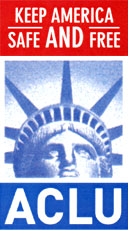 |
 USA
Patriot Act weakens checks and balances USA
Patriot Act weakens checks and balances
When President Bush signed the USA Patriot
Act into law in early-November, he significantly boosted the
government's law enforcement powers while continuing a trend
to cut back on the checks and balances that Americans have traditionally
relied on to protect individual liberty. From legal analysts
with the American Civil Liberties Union (ACLU), the following
summary highlights the new law's potential impact on individuals
and groups.
"This law is based on the faulty assumption that safety
must come at the expense of civil liberties," said Laura
W. Murphy, Director of the ACLU's Washington National Office.
"The USA Patriot Act gives law enforcement agencies nationwide
extraordinary new powers unchecked by meaningful judicial review."
"For immigrants," added Gregory T. Nojeim, Associate
Director of the ACLU Washington Office, "the law is a dramatic
setback that gives the government the authority to detain - indefinitely
in some cases - non-citizens who are not terrorists on the basis
of vague allegations of a risk to national security."
Among the USA Patriot Act's most troubling provisions, the ACLU
insists, are measures that:
- Allow for indefinite detention of non-citizens
who are not terrorists on minor visa violations if they cannot
be deported because they are stateless, their country of origin
refuses to accept them or because they would face torture in
their country of origin.
- Minimize judicial supervision of federal
telephone and Internet surveillance by law enforcement authorities.
- Expand the ability of the government to conduct
secret searches.
- Give the Attorney General and the Secretary
of State the power to designate domestic groups as terrorist
organizations and deport any non-citizen who belongs to them.
- Grant the FBI broad access to sensitive business
records about individuals without having to show evidence of
a crime.
- Lead to large-scale investigations of American
citizens for "intelligence" purposes.
For drug war prisoners and others interested in the criminal
justice implications of the Patriot Act, ACLU analysts say "the
law dramatically expands the use of secret searches. Normally,
a person is notified when law enforcement conducts a search.
In some cases regarding searches for electronic information,
law enforcement authorities can get court permission to delay
notification of a search. The USA Patriot Act extends the authority
of the government to request "secret searches" to every
criminal case. This vast expansion of power goes far beyond anything
necessary to conduct terrorism investigations.
The Act also allows for the broad sharing
of sensitive information in criminal cases with intelligence
agencies, including the CIA, the NSA, the INS and the Secret
Service. It permits sharing of sensitive grand jury and wiretap
information without judicial review or any safeguards regarding
the future use or dissemination of such information.
These information-sharing authorizations and mandates effectively
put the CIA back in the business of spying on Americans. Once
the CIA makes clear the kind of information it seeks, law enforcement
agencies can use tools like wiretaps and intelligence searches
to provide data to the CIA. In fact, the law specifically gives
the Director of Central Intelligence - who heads the CIA - the
power to identify domestic intelligence requirements.
The law also creates a new crime of "domestic terrorism."
The new offense threatens to transform protestors into terrorists
if they engage in conduct that "involves acts dangerous
to human life." Members of Operation Rescue, the Environmental
Liberation Front and Greenpeace, for example, have all engaged
in activities that could subject them to prosecution as terrorists.
Then, under this law, the dominos begin to fall. Those who provide
lodging or other assistance to these "domestic terrorists"
could have their homes wiretapped and could be prosecuted."
Source: The American Civil Liberties
Union, November 2001

|